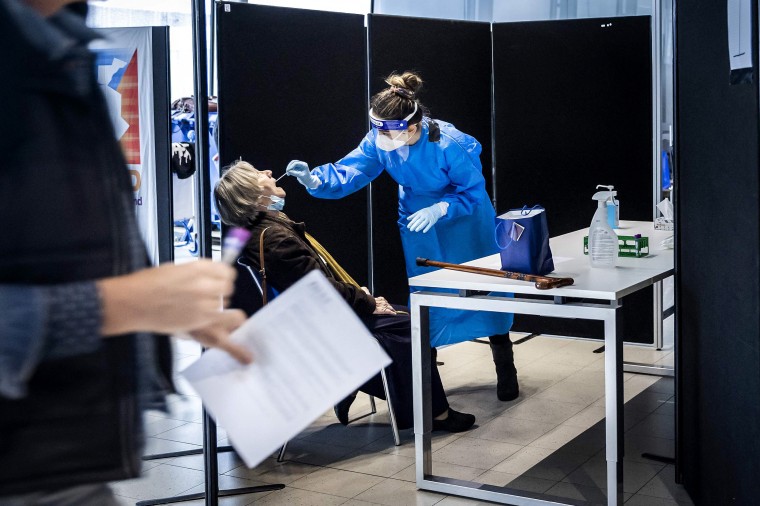World health officials scrambled to react to the growing omicron outbreak Wednesday amid new evidence that the mutant Covid-19 variant may have spread well beyond southern Africa by the time it was first detected.
Dutch health officials said Tuesday they had found omicron in samples taken on Nov. 19 and Nov. 23, suggesting the variant had a bigger head start in Europe than previously believed.
“It is not clear yet whether these people have visited southern Africa,” the Dutch National Institute for Public Health said in a statement.
The variant was first reported to the World Health Organization by South African authorities on Nov. 24, but it is unclear where or when it may have originated.
Earlier this week, the Netherlands reported at least 14 omicron cases among passengers who arrived aboard two flights from South Africa on Nov. 26.

Meanwhile, Nigeria has detected its first case of the omicron variant in a sample it collected in October, the Associated Press reported Wednesday, quoting the country’s national public health institute.
Europe has been experiencing one of the strongest surges of Covid-19 in recent weeks, but cases are now also climbing up in other parts of the world. In South Korea, the daily jump in coronavirus infections exceeded 5,000 for the first time since the start of the pandemic as health officials probed suspected omicron cases.
The first reported omicron case in Latin America has also emerged in Brazil, the Associated Press reported.
No omicron cases have been detected in the United States so far, but health experts have said it’s only a matter of time — as the Biden administration is considering tightening requirements for international travel.
"It will be coming," Dr. Richard Besser, a former acting director of the CDC, told NBC News Tuesday night. "Being ready for it and being able to react based on how severe it is — is critically important."
Download the NBC News app for breaking news and politics
The discovery of omicron has sparked international concern that it could prolong the pandemic, which has already claimed more than 5 million lives worldwide. Much remains unknown about the new variant, including whether it is more transmissible, leads to more severe illness or can escape immune defenses rendered by the vaccines.
That lack of certainty has prompted several countries to enact sweeping travel bans.
Japan was the latest to ban all foreign visitors starting Tuesday as it confirmed its first omicron case. In a further tightening of restrictions Wednesday, the country's flag airlines halted new reservations for international flights to Japan until the end of December, Reuters reported.
WHO chief Tedros Adhanom Ghebreyesus cautioned against hasty travel bans, saying southern African countries that first reported the new variant are being “penalized” for doing the right thing.
“I well understand the concern of all countries to protect their citizens against a variant that we don’t yet fully understand,” Tedros said. “But I am equally concerned that several member states are introducing blunt, blanket measures that are not evidence-based or effective on their own, and which will only worsen inequities.”
Tedros also warned that the delta variant, which accounts for almost all cases globally, remains highly transmissible and dangerous.
Also on Wednesday, the WHO agreed to launch negotiations on an international pact to prevent and control future pandemics, calling it a "once-in-a-generation opportunity" to strengthen global health response systems.
Tedros urged member states to end the current pandemic as "a matter of choice," and work towards vaccinating 40 percent of the population of every country by the end of this year.
